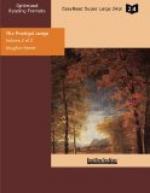“Uncle Bob fetched me,” said Hannibal. “He’s down-stairs, but he didn’t tell me Mr. Mahaffy was dead-”
“We have sustained a great loss, Hannibal, and we must never forget the moral grandeur of the man. Some day, when you are older, and I can bring myself to speak of it, I will tell you of his last moments.” The judge’s voice broke, a thick sob rose chokingly in his throat. “Poor Solomon! A man of such tender feeling that he hid it from the world, for his was a rare nature which only revealed itself to the chosen few he honored with his love.” The judge lapsed into a momentary brooding silence, in which his great arms drew the boy closer against his heart. “Dear lad, since I left you at Belle Plain a very astonishing knowledge has come to me. It was the Hand of Providence—I see it now—that first brought us together. You must not call me judge any more; I am your grandfather your mother was my daughter.”
Hannibal instantly sat erect and looked up at the judge, his blue eyes wide with amazement at this extraordinary statement.
“It is a very strange story, Hannibal, and its links are not all in my hands, but I am sure because of what I already know. I, who thought that not a drop of my blood flowed in any veins but my own, live again in you. Do you understand what I am telling you? Your are my own dear little grandson—” and the judge looked down with no uncertain love and pride into the small face upturned to his.
“I am glad if you are my grandfather, judge,” said Hannibal very gravely. “I always liked you.”
“Thank you, dear lad,” responded the judge with equal gravity, and then as Hannibal nestled back in his grandfather’s arms a single big tear dropped from the end of that gentleman’s prominent nose.
“There will be many and great changes in store for us,” continued the judge. “But as we met adversity with dignity, I am sure we shall be able to endure prosperity with equanimityonly unworthy natures are affected by what is at best superficial and accidental. I mean that the blight of poverty is about to be lifted from our lives.”
“Do you mean we ain’t going to be pore any longer, grandfather?” asked Hannibal.
The judge regarded him with infinite tenderness of expression; he was profoundly moved.
“Would you mind saying that again, dear lad?”
“Do you mean we ain’t going to be pore any longer, grandfather?” repeated Hannibal.
“I shall enjoy an adequate competency which I am about to recover. It will be sufficient for the indulgence of those simple and intellectual tastes I propose to cultivate for the future.” In spite of himself the judge sighed. This was hardly in line with his ideals, but the right to choose was no longer his. “You will be very rich, Hannibal. The Quintard lands—your grandmother was a Quintard—will be yours; they run up into the hundred of thousand of acres here about; this land will all be yours as soon as I can establish your identity.”




